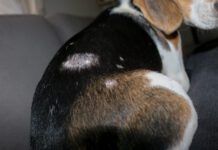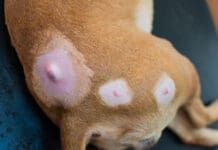Home Search
allergies - search results
If you're not happy with the results, please do another search
Your Dog’s Anal Glands and Sacs
Oh, the smell! Anyone who's ever been in the same room when a frightened dog blows" her anal glands or a veterinarian manually expresses them will never forget the malodorous experience. It's wise for dog owners to be aware of the problems that can arise with these glands
Treatment for Canine Heartworm Infections
Treatment for a heartworm infection is critical, but it's not without risk. By being prepared for what can happen, you should be able to bring your dog through safely. Whether or not you choose to use conventional heartworm preventatives, there is always the possibility that you may one day find yourself with a heartworm-positive dog, and be faced with the decision of how to treat her.
Best Dog Treats
To our dogs, food is love – and security, affirmation, and reinforcement. When we give our dogs what trainers refer to as “high-value” treats – foods that are especially sweet, meaty, or pungent – our message gets through to them especially loud and clear. Behaviorists are highly appreciative of the ability of food treats to “classically condition” a dog to tolerate, and then even enjoy, environmental stimuli that he previously found frightening or threatening.
Herbal Remedies for Inflammatory Bowel Disease (IBD)
Conventional approaches to inflammatory bowel disease often involve a controlled diet of highly digestible foods that are rich in supplemental dietary fiber. Often, cortico-steroid drugs (such as Prednisone) and other immunosuppressive drugs are prescribed to rapidly reduce pain and inflammation. These drugs may bring fast, temporary relief from painful symptoms, but they can be risky, especially if employed long-term.
Change of Dog Food Stops Seizures
On April Fool's Day 1996, my soon-to-be-husband took me to get a puppy. We already had one dog, Ladybird, but she was getting older and we felt a young friend would encourage her to be more playful. We also hoped Ladybird would pass on some of her fine qualities to the puppy. We drove out of town to a place where people play paintball. There were more than a dozen young dogs running around, and the owner told us to take our pick. One young female seemed to want my attention more than any of the others, and I fell in love with her pretty face. We took her home and named her Cheyenne.
The Ancestral Dog Food Diet
Dog food as we know it today that is, either crumbly bits of kibble packaged in bags and boxes or gloopy meat-based concoctions sealed into cans was invented in 1860. Think about that for a moment. Our great-grandparents and great-great-grandparents raised dogs completely without the benefit of Purina. Before 1860, no one poured a pile of chow from a bag marked, Dog." Everyone who had a dog knew what dogs ate and how to feed them. "
A Holistic Dog Behavior Consultant’s Opinion on Dog Door Aggression
As a holistic behavior consultant, I believe that most problems people experience with their dogs are not really dog problems but rather communication problems. Dogs don't have problems being dogs; they have problems being dogs who live with humans. Most humans don't even know how to communicate with each other! Every interaction you have with a dog teaches the dog something about living with a human.
Choosing Canine Supplements Wisely
Sometimes, the deficiency is discovered when a blood test is performed for the purpose of analyzing the dog’s nutritional status (although, in my opinion, there are some problems with this methodology (see “Blood Testing for Deficiencies,” next page). In other cases, a dog owner might know that the diet he feeds is deficient in a certain nutrient, and he supplements rather than changes the formulation of the diet. For example, dogs who are fed a diet based on raw meats and vegetables, but who don’t receive fresh ground bones, are more than likely to be deficient in calcium.
Identifying and Treating Staph Infections in Dogs
Symptoms of a superficial staph infection include hair loss and the presence of pustules. It can worsen into a deep staph infection with fever, pain, and crusting skin.
Can Dogs Get Poison Ivy?
Poison ivy can affect our dogs, but luckily most dogs have enough hair that the sap usually does not get down to skin. However, any dogs with condition that leaves them with exposed bare skin are all susceptible to the rash.
Is That a Cyst or a Tumor?
A “cyst” is a capsule that usually has fluid in it, although it can have air as well. “Tumor” is a general term, basically a generic swelling or mass.
Home Remedies for Itchy Dogs
When itching starts, consider what might have caused that reaction. Home remedies for itchy dogs might help, but only if they address the cause of itching.













